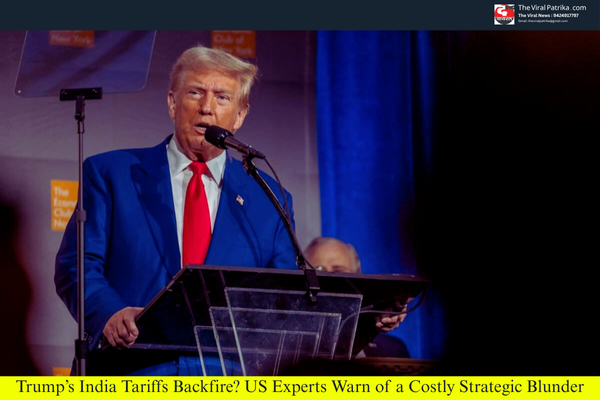The Trump administration’s decision to slap 50% tariffs on Indian imports has ignited sharp criticism in Washington and beyond. Far from strengthening US leverage, analysts argue the move could damage long-term strategic ties with India, while empowering rivals like Russia and China.

Why Did Trump Target India?
The tariffs were framed as punishment for New Delhi’s continued purchase of Russian oil despite Western sanctions. However, critics note a glaring inconsistency — China, a much larger buyer of Russian energy, was never sanctioned.
Former US National Security Advisor John Bolton blasted the move, saying a trade-first mindset ignored critical geopolitical realities:
Double Standards in US Sanctions
Bolton also highlighted that during Trump’s presidency, US-Russia trade grew by nearly 20%, even as India was penalized. This selective approach raised doubts about the credibility of Washington’s sanctions strategy.
Academic Voices Join the Criticism:
Three prominent scholars have openly opposed Trump’s tariff policy toward India:
- John Mearsheimer, a University of Chicago professor, called the sanctions a “huge mistake” and argued that New Delhi will not bow to secondary sanctions.
- Richard Wolff, an American economist, warned that Trump’s aggressive trade measures are pushing BRICS nations to consolidate as an economic counterweight to the West.
- John Bolton reiterated that punishing India while sparing China makes no strategic sense for Washington.
India Pushes Back:
India described the tariffs as “unfortunate” but reaffirmed its stance: energy security comes first. Officials emphasized that India will continue to source oil as it sees fit, prioritizing national interests over foreign pressure.
Moreover, Indian diplomats have warned that such actions risk undoing decades of US efforts to reduce New Delhi’s dependency on Moscow. Instead of weakening Russia’s hold, tariffs may push India closer to Russia and China.
The Bigger Picture:
At a time when the US needs India as a partner in the Indo-Pacific to balance China’s rise, Trump’s tariff policy appears counterproductive. What was intended as pressure may instead be remembered as a strategic blunder that weakened trust between two key allies.The tariffs were framed as punishment for New Delhi’s continued purchase of Russian oil despite Western sanctions.
Former US National Security Advisor John Bolton blasted the move, saying a trade-first mindset ignored critical geopolitical realities
FAQs on Tariffs on India:
1. Why did Donald Trump impose tariffs on India?
introduced a 50% tariff on Indian imports as a punishment for New Delhi’s continued purchase of Russian oil, despite Western sanctions.
2. Why are US think tanks criticising Trump’s tariffs on India?
American experts argue that the tariffs are a strategic mistake, as they damage long-term US-India relations while sparing bigger Russian oil importers like China.
3. What did John Bolton say about tariffs?
Former US National Security Advisor John Bolton said Trump’s focus on trade ignored the larger strategic picture and accused him of applying sanctions inconsistently by penalising India but not China.
4. How did India respond to the US tariffs?
India called the tariffs “unfortunate” and reaffirmed its commitment to protecting national interests. Despite pressure, it has continued importing Russian oil.
5. What could be the long-term impact of Trump’s tariffs on India?
Experts warn that policies may push India closer to Russia and China, weaken trust in US partnerships, and accelerate the growth of BRICS as an alternative economic bloc.
ABOUT EXCLUSIVE VIRAL NEWS:
- Dussehra 2025: Towns in India Where Ravan Is Worshipped, Not Burned
- Chidambaram Reveals: US Stopped India from Military Retaliation After 26/11 Mumbai Attacks
- Ind vs Pak Live Score, Asia Cup Final 2025: Pakistan Dominate Early, India Under Pressure
- Google’s 27th Birthday: The Real Story Behind the Celebration
- Xiaomi 17 Pro Launched: Price, Specs, and Features
- Flipkart Big Billion Days 2025: iPhone 16 का आखिरी मौका
